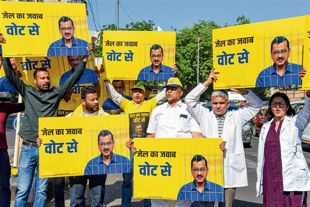
Antony Jacob
The monsoon is good for the economy. But it also brings with it problems of mosquito breeding that result in the spreading of viral diseases. Usually, the monsoon lasts from June to September and we see a surge in dengue cases around September and October. The case numbers start to decline as soon as the humidity and mercury dips in November.
Dengue is the world’s fastest growing mosquito-borne disease, currently threatening half of the world's population and India shares a significant burden of the total healthcare spends on treatment for dengue. The economic burden inflicted by dengue on the country is around $1.11 billion a year.
Dengue cases have risen drastically over the years and as per provisional data available from National Vector Borne Disease Control Program (NVBDCP), India has witnessed a three-fold increase in the number of dengue cases reported between 2010 (28,292 cases) and 2016 (99,913 cases) with severe symptoms that require hospitalisation.
Insights from our internal data indicate that 60% of dengue claims are received in the month of September and October. The data also points towards the fact that children are the most affected by the dengue mosquito. This is predominantly due to the fact that the Aedes aegypti is a day-biting mosquito. This mosquito is most active during the daylight, for about two hours after sunrise and several hours before sunset. It rests indoors in closets and other dark places and they are found outside, in cool and shaded areas.
The worst-affected sites for the past few years have been in New Delhi and across the states of Haryana, Punjab and Karnataka. Southern states such as Kerala, Telangana and Andhra Pradesh have reported a large number of cases, while Maharashtra has also borne the brunt of large dengue attacks.
Most dengue cases don’t need inpatient care and can be treated at home, as it is a self-limiting disease. It is the lack of awareness that creates panic among people causing scarcity of hospital beds.
When treated properly, dengue haemorrhagic fever has a mortality rate of 2-5%, but when left untreated, the mortality rate is as high as 50%.The average inpatient treatment claim amounts to approximately Rs 35,000-Rs 40,000 while one would need Rs 7,000-Rs 10,000 purely for diagnosis and OPD. The average hospitalisation for dengue fever lasts for six days. It results in significant cost for the patient, both in hospital fee and in the form of time missed away from work. More importantly, medical expenses with respect to treating the ailment have also gone up, at a CAGR of 6% over the past five years.
Unable to bear the cost of dengue treatment, people have started making insurance claims for their medical expenses. A year-on-year comparison shows that dengue has been slowly creating havoc, both physically and financially. Our internal data shows that in 2014-15, around 2,600 claims were received related to dengue, and there was an increase to more than 7,000 claims in 2015-16. The total number of claims settled by the company totalled Rs 235 million during the last financial year.
Although health insurance does cover some dengue-related costs, over 80% of the Indian population does not have the cover they need to counter medical expenses. Dengue does not discriminate between people on the basis of gender or age or socio-economic class or where they live. Although deterrents such as removal of stagnant water, fumigation of low lying areas and application of oral insect repellants are predominantly suggested and implemented, they cannot rule out a dengue infection. As a result, insurers are coming to the aid of those people who are not covered by any form of insurance, to offer low cost Over-The-Counter type of policies to ward off the expenses related to dengue in case one is afflicted.
Since such covers come with very low premium, they help in on boarding the strata of population who remains hesitant to purchase a health insurance policy simply because of the cost involved and the lack of understanding of its benefits. It enables the adoption and acceptance of health insurance, while keeping the costs low for a family or individual. Specialised covers are also poised to aid insurers to increase penetration among different segments of population across cities and towns.
Buying a specialised health insurance over and above one’s current health insurance policy also offers several advantages. While a standard indemnity health insurance policy covers only medical expenses incurred during inpatient treatment, a specialised cover will reimburse outpatient billing besides covering for inpatient treatment. In the case of dengue, this is important as most dengue patients are cured via outpatient treatment. Furthermore, a standalone product to cover specific ailment related expenses will help policyholders to protect the no-claim bonus benefits accumulated in their existing insurance policies.
The increasing burden of dengue in the country has attracted many scientific, private organisations as well as the Indian Government's administrative attention. Various initiatives such as awareness programmes on human behaviour, waste management system, efficacy of vector control programmes and hygiene are being implemented nationwide to control dengue.
As for insurance companies, the right direction would be to offer more and more easy-to-understand customer-friendly products, affordable premium, simple to activate, no complicated claims procedure to take care of medical treatment related to this epidemic.
The writer is CEO, Apollo Munich Health Insurance. The views expressed in this article are his own



























